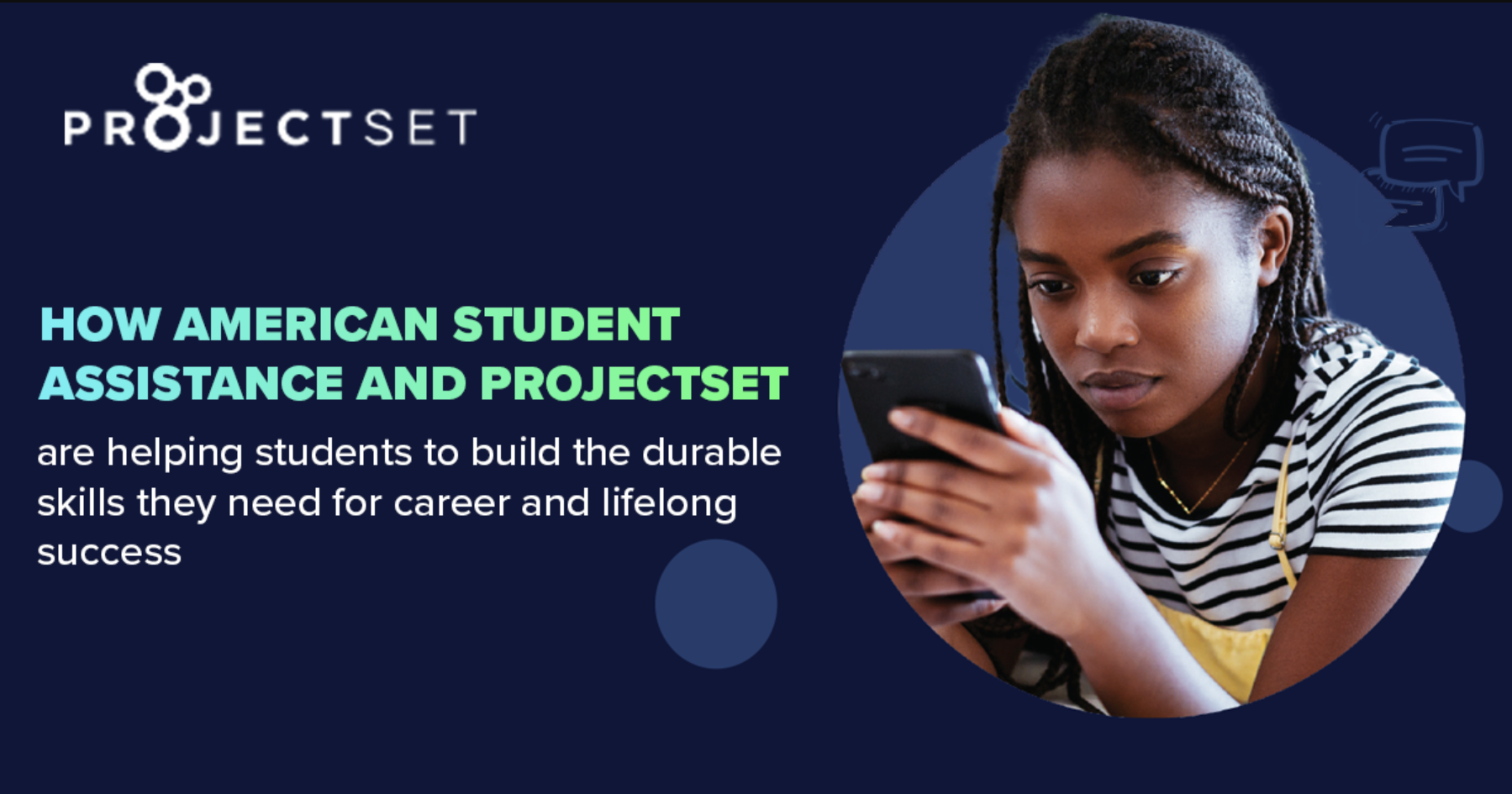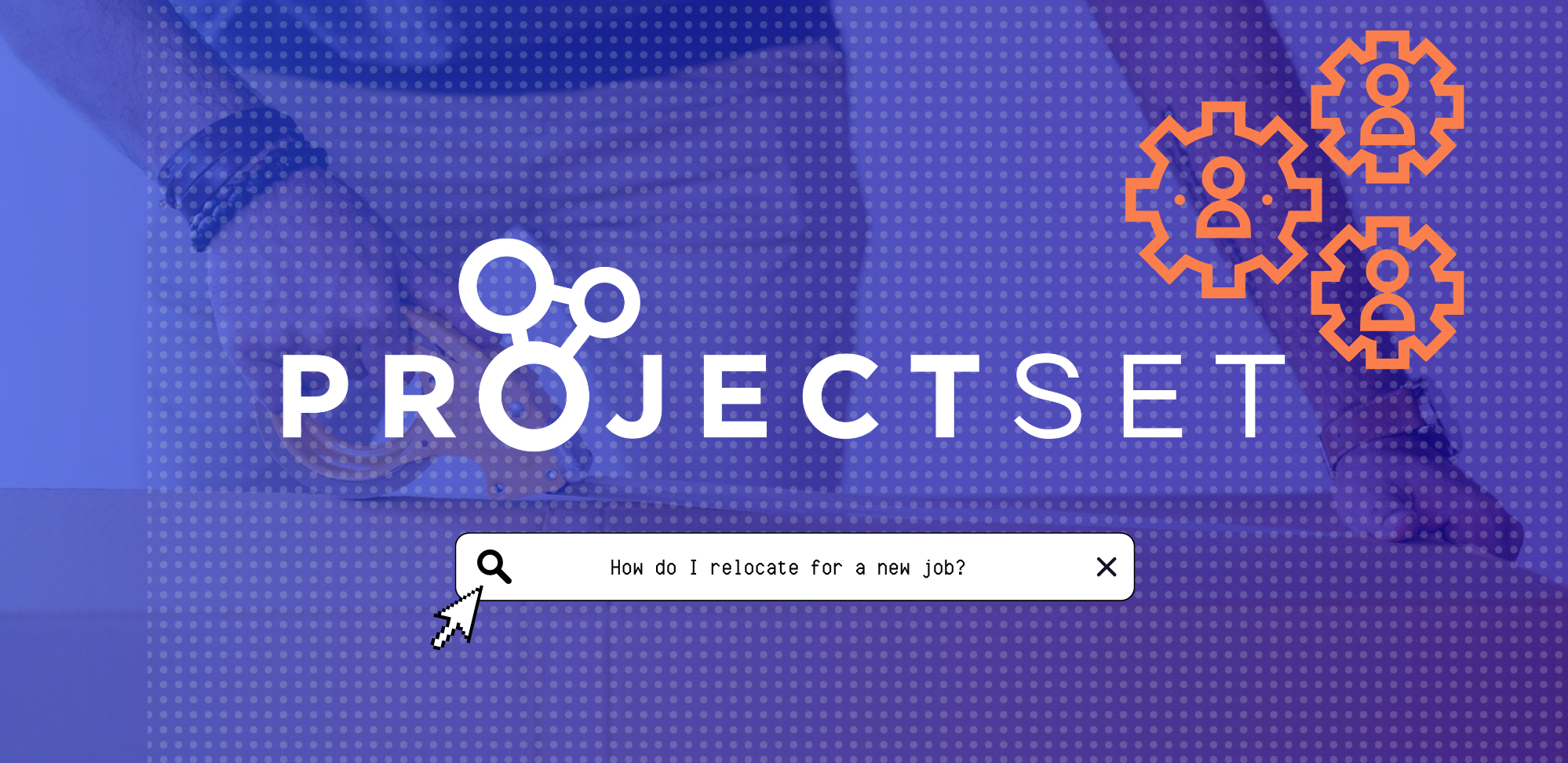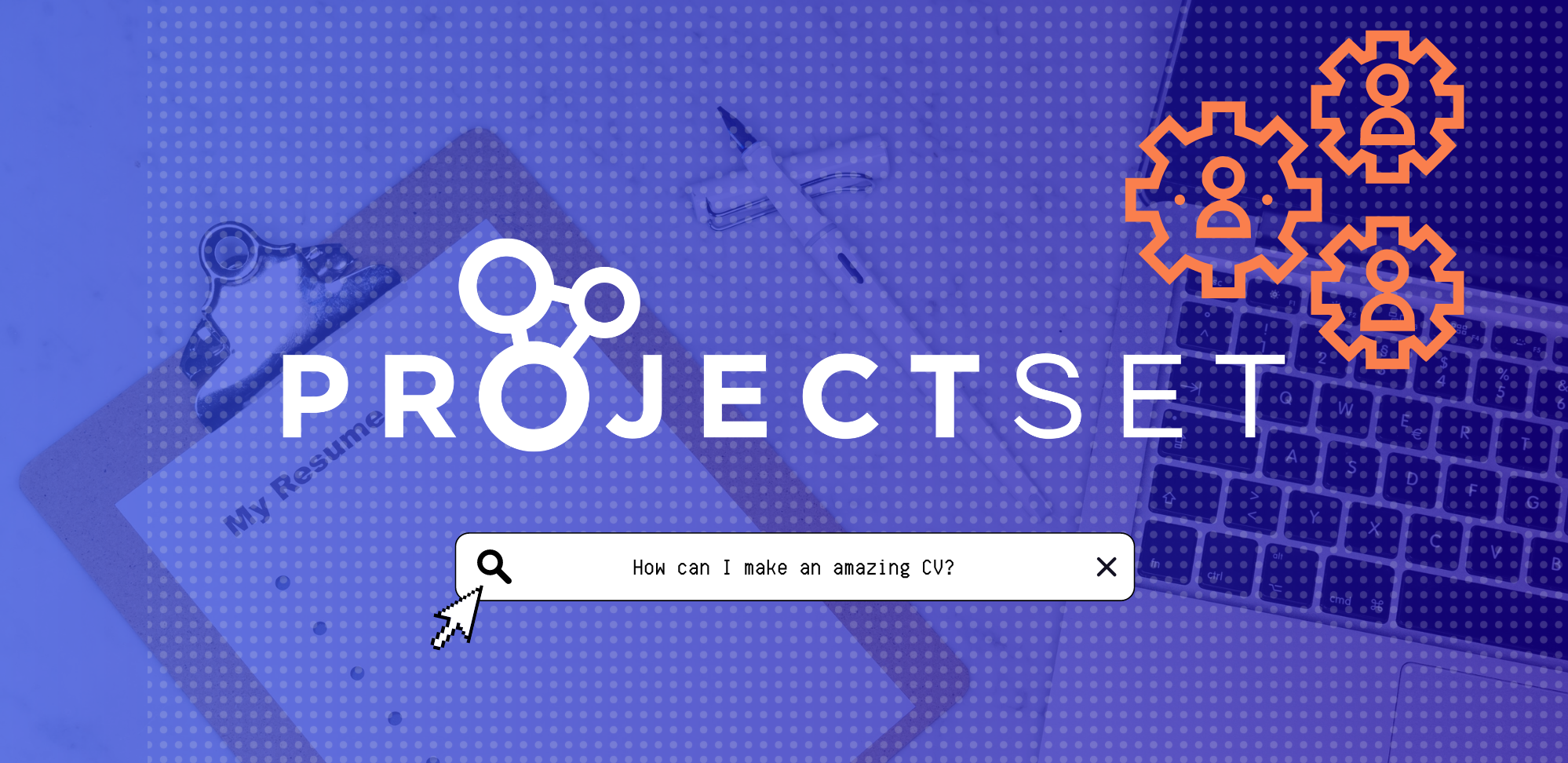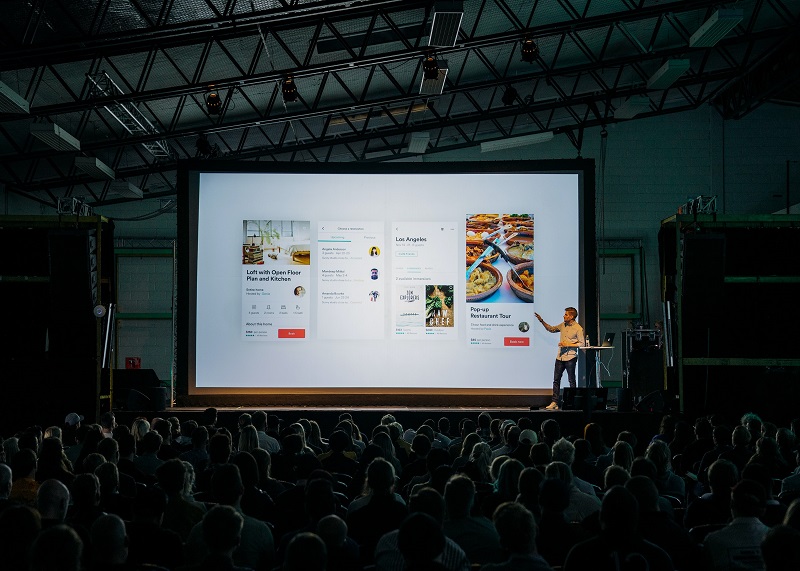American Student Assistance® (ASA) and ProjectSet established a partnership in 2023 to initiate middle and high-school students into the world of Durable Skills. ProjectSet designed and delivered a suite of work-based learning tasks and activities for EvolveMe®, ASA’s career experimentation and skill-building platform. Launched in 2023, EvolveMe is an award-winning, platform that incentivizes young people to take actions that advance their career interests. Through the platform, teens have access to more than 180 diverse career experimentation tasks—powered by innovative partner organizations like ProjectSet—with an 81 percent completion rate. The collaboration has had outstanding impact since the launch of EvolveMe in early 2023. More than 100,000 students have engaged on ProjectSet tasks and activities on EvolveMe, clocking over 50,000 hours. Moreover, 93% of them completed their tasks and gave a 9.4 average feedback rating. Clay Colarusso, CMO and SVP of Digital Strategy (ASA) says, “ProjectSet has been an incredible partner in helping our students build durable skills. Their self-guided, personalized programs have high conversion and completion rates among our students. We are excited to continue building on this partnership!” For a deeper look at how ASA and ProjectSet have teamed up to help students build the durable skills they need for career and lifelong success, and the results we’ve seen thus far, read the full case study below. Click here to read the full case study.

Many school district leaders are adopting the Life Ready Student model to address the gap between K-12 education and workforce needs. In 2019, the National School Boards Association (NSBA) and the Society for Human Resource Management (SHRM) highlighted this issue, focusing on two key questions: How can schools bridge the gap in soft skills—also known as durable skills such as time management and resourcefulness—and how can education and business leaders collaborate to better support students? Continue Reading...

As digitisation takes an increasing hold in our personal and professional lives, video CV is emerging as a fresh, powerful way to present ourselves. A video CV is a short audio-visual presentation for us to showcase our skills, experiences, and capabilities in a way that goes beyond the limitations of a traditional static, paper-based resume in 3 key ways! 1. Personalise, Beyond Words A video CV puts face and voice to the text and words in a traditional resume. It lends a human touch by uncovering your motivations, passions, and unique attributes in a way that resonates with recruiters on a personal level. Speaking confidently and maintaining eye contact, you can narrate your journey and achievements in a video CV more powerfully than a long list of qualifications can. 2. Get Yourself Heard, Get Away From the Herd Use the magic of colours, movements and sounds in a video CV to engage your audience effectively. Simply speak into a camera or use visually engaging slides, images, video clips or sounds to highlight your unique attributes and suitability for a role. For example, you may provide a short demo of a relevant project when applying for a software coding role; or present a design portfolio when applying for a digital marketing, PR or media role. Overall a video CVs demonstrates your proficiency in handling digital communication media. 3. Don’t Choose, Don’t Lose You don’t need to choose either/ or; use a video CV in addition to – not in place of – the traditional text CV. This way, you offer your audience a choice and yet leverage the power of different media forms to grab their attention. As the job market becomes increasingly competitive, job seekers are scrambling to find ways to stand out from the crowd. Video CVs offer a novel and impactful way to capture recruiters' attention and differentiate oneself from other candidates. Remember: the objective of you CV is not to get you the job…. But just to get you on the list of interviewees. Light, Camera, Action! So, grab your camera, script your story, and step confidently into the future of job applications with your very own video CV. Take that important step into the digital age to stand out in a hyper-competitive and super-crowded job market. You may want to view these examples to get some creative ideas on how to script your winning video CV. Check Out Some Inspiration:

Relocating for a new job can be a challenging task. It requires a great deal of planning, organisation, and the ability to adapt to new situations. However, with the right approach and mindset, you can make this process less stressful, more cost-effective, and time-efficient. This guide provides a comprehensive framework to help you navigate through your upcoming career-related relocation smoothly. The Home Buying Process The first step in your career-related relocation is finding a new home. It's crucial to understand the home buying process to avoid unnecessary costs and stress. Consider the option of buying a house "as is," which means purchasing the property in its current condition without the seller making any repairs or improvements. This strategy can save you money upfront, but it's essential to get a thorough home inspection to avoid potential costly issues down the line. Consult Friends and Family If you have friends or family near your new location, don't hesitate to reach out to them for advice and support. They can provide valuable insights about the area, such as the best neighborhoods, local amenities, and cost of living. Their firsthand experiences can help you make informed decisions and ease the transition. Establish a Moving Budget Creating a realistic moving budget is an essential step in your relocation process. It should include expenses like hiring movers, packing materials, transportation, and potential accommodation costs. Remember to factor in some extra funds for unexpected expenses. A well-planned budget will help you manage your finances better and prevent overspending. Plan and Organize Your Move Effective planning and organisation are key to a successful move. Start by creating a timeline for your move, detailing tasks such as packing, hiring movers, and setting up utilities at your new home. Prioritise decluttering before packing to reduce the volume of items you need to move. Also, make sure to label boxes clearly to make unpacking easier. Connect with Moving Professionals Hiring professionals can make your move smoother and more efficient. Do your research and get quotes from multiple moving companies to ensure you're getting the best deal. Check their reviews and ratings to ensure they're reliable and reputable. Remember, the cheapest option isn't always the best one, especially when it comes to handling your valuable possessions. Communicate with Your Employer It's crucial to maintain open lines of communication with your employer throughout the relocation process, discussing your moving schedule to ensure it aligns with your start date. If your company offers relocation assistance, make sure to understand the terms and utilise the benefits. Moreover, keeping your employer updated about your transition progress can help in resolving any potential hiccups promptly and efficiently. Network with Locals Networking with locals can help you settle into your new environment faster, whether it's by joining local clubs or groups related to your interests, attending community events, or using social media platforms to connect with people in your area. Building a local network can make your new location feel more like home, and furthermore, these connections might also open up unexpected opportunities in your new job and social life. A career-related relocation is a significant life event that requires careful planning and execution. By following this guide, you can navigate the process with less stress, cost, and time. Remember to stay flexible and open-minded throughout the process, as unexpected challenges may arise. With the right preparation and mindset, your relocation can be an exciting new chapter in your career and personal life.

You cannot make a perfect CV - because there is no such thing as one! But keep reading to learn some tips and tricks to create a CV that's perfect for you. Let’s dive into these tips and tricks that will help you create your own version of a perfect CV to land you your dream job. Do your research Sound boring? Well, no pain no gain! You need to research the skills that recruiters are looking for. Go on platforms like LinkedIn, TotalJobs, etc to search for your desired roles, and go through the job descriptions. Try to highlight some key skills and note them down. See below for an example: After doing your research, let's start writing your actual CV. The first quarter of the CV is very important as that is what the recruiter will look at and decide whether to continue further reading your CV or not. This part of the CV needs to be impactful. Add LinkedIn to your profile You can add a custom LinkedIn URL or try to embed a word hyperlink to your LinkedIn profile. This is a must, as it will help the recruiter look at your personal branding in broader terms. Use a professional email address Let's be real, waiting4you@outside.com is not a professional email address. It should be formatted appropriately, for example: firstname-surname@gmail.com. When your email address looks professional, it comes across as genuine as well. Your 'Education' section Recruiters do not worry about how many grades you have scored because they know that having practical proven experience will be more effective. Sometimes they might look for key qualifications such as English and Mathematics, but they will make this clear in their job descriptions. So rather than including your scores, mention your projects and competition achievements. Your 'Experience' section This section needs to start with your latest relevant experience. Always start the sentence with action words. It should be in bullet points and with meaningful measurable metrics. The Responsibility and Result formula can be used to create these bullet points. For people with no experience, you can also add your internship experience or any other project you have worked on in your course or at any other place. For instance, rather than using “Creatively arranged the store items to increase footfall”, you could write, “Increased footfall in the store by efficiently creating visual display as a result of which sales increased by 20%”. TIP: If you are an experienced candidate, you can move the Experience section above the Education section! Your 'Skills' section Soft skills are usually underrated when it comes to the skills section. They are as equally important as hard skills because, referring to the example above, the person was able to increase sales because they have communication skills, a can-do attitude, and team leadership skills. Hard skills are also a must as technicalities are always there. These can include some software, some apps, or even some systems that you can operate. The key is combining your soft skills with your hard skills to show your capabilities at your workplace. Do not use buzzwords or clichés! This is a big NO! Avoid using phrases like “Hard working team player”, “I go the extra mile”, and “I am a strong communicator”. Rather than stating these phrases, show their implication. That way it will be more convincing. For example: rather than saying "I go the extra mile", say what you did to go above and beyond to achieve that goal or target. (You can google resume buzzwords or clichés and remove all this from your CV.) Use the right keywords and skills (you have already done your research before so this will be easier) in order to make your application considered for an interview. Your 'Certificates/Achievements' section It is not mandatory to have this section in your CV but is advisable since it will show your professional achievements. You can fill this section with list of all the certificates and awards you have, with the latest one being on the top. If you wish you can also mention the year in which you secured the certificate as well. If you have any sports achievements you can mention them as well. To see how to add your sports achievement to your CV, we've written another blog post on the topic that you can read here. Some general tips! Keep your CV simple and short with a length of around 1-2 pages with all the most relevant information on page 1. Tailor your CV according to the job description of the particular job you are applying for. Do not overlook the small things like grammar and spelling mistakes. Follow the same structure throughout the CV. Once your CV is finished, email it to ten individuals you know or submit it to some recruiters and alumni; get their input and make any necessary revisions. ProjectSet is also one such platform where you can take part in virtual hackathons, competitions, projects and much more which can be added to your CV. Sign up for free and boost your CV today!

Collaboration is a powerful tool for any business. By fostering better collaboration between teams, businesses can foster a culture of open communication and creative problem-solving that leads to greater success. Here are some tips on how business owners and leaders can improve collaboration in their companies. Develop Opportunities For Collaboration Across Teams Encouraging collaboration among employees from different departments or areas is crucial for a successful business. By working together on projects and initiatives, employees gain a deeper understanding of each other's roles and responsibilities. This, in turn, can lead to more effective communication, problem-solving, and ultimately better results for the company. Create a Culture of Open Communication Encouraging open communication between employees is essential when it comes to successful collaboration. Leaders should foster an environment where team members feel comfortable expressing their views and opinions without fear of retribution or judgment. This kind of open dialogue helps teams identify problems quickly while also developing trust among team members which is crucial when collaborating on projects. Embrace Feedback for Successful Collaboration Feedback is key to successful collaboration. It is essential to identify the areas of strength and improvement within teams, and even across departments so that everyone can benefit. Encouraging feedback promotes a culture of continuous learning which is necessary for businesses to stay ahead in today's competitive market. Recognise Collaboration Achievements Rewarding your employees for their collaborative efforts can be a powerful motivator to encourage continued teamwork. While monetary incentives are always appreciated, non-monetary rewards like recognition during meetings or a simple thank-you note can go a long way in showing appreciation and fostering a positive team culture. By recognising and rewarding collaboration, leaders can encourage more employees to join in and contribute to successful teamwork. Offer Training and Resources To achieve successful collaboration, having the right tools and resources is crucial. Leaders should ensure that team members are trained on how to use them effectively, and that they are easily accessible at all times. By doing so, teams can work more efficiently, communicate more effectively, and ultimately achieve better results. Schedule Regular 1:1s Regular 1:1s between managers and staff are key for aiding communication in any organisation, with a particular emphasis on improving collaboration between departments/teams. The purpose of these meetings should be to build trust and open dialogue for encouraging better cooperation between those involved. Remote conversations can be beneficial too, even if only indirectly. Compress PDFs Compressing PDFs can significantly improve business collaboration by reducing file size, making it easier to share and collaborate on documents with others. With smaller files, team members can share documents quickly and efficiently, even when working remotely or on slow internet connections. Compressed PDFs also take up less storage space, freeing up memory on devices and increasing overall efficiency. If you’re looking for an easy way to compress PDFs, this tool may help. Leverage Cloud-Based Project Management Cloud-based project management platforms offer a convenient solution for teams to collaborate effectively, regardless of their physical location or circumstances. With real-time updates and easy access to tasks and data, these platforms can significantly improve productivity and enhance collaborations among geographically dispersed teams. Improving collaboration within businesses is crucial for achieving success both now and in the future. By taking steps like utilising a project management platform, compressing PDFs, and embracing feedback, companies can unlock great benefits from increased collaborations among their staff, regardless of their physical location. Visit ProjectSet to find virtual internship opportunities that will help you develop your skills and boost your career prospects. Photo by RF._.studio: https://www.pexels.com/photo/woman-writing-in-paper-3810788/

Brandon Stambaugh (a.k.a Brandon the Creative) is the Lead UI/UX Designer at Zealic Solutions. He enjoyes refinishing guitars, vollecting vinyls and learning anything and everything! Read on for insight on the ins and outs of his workday. I've always been a creative type, it just took me a while to figure out what to do with it. For me, getting into and progressing through the design field has been equal parts hard work and serendipity. My current position is Lead UI/UX Designer at Zealic Solutions, a boutique product development company focusing in the Healthcare and Life Science market. In no way did I plan to be where I am in my career, I didn’t set out to do User Interface or User Experience design and I definitely didn't know a lot about the Healthcare and Life Science industry. But here I am and I love it. As things are unfolding they don't always make sense but, when you look back at your path, you can see what it all meant and how it led you to where you were supposed to be. For instance, for an elective class in high school I participated in the Adobe Digital Media Academy where I learned how to use the entire Adobe Creative Suite (graphic design, video production, animation, etc.). Then I went to college where I got my degree in Industrial Design focusing in Product Design (designing physical products). I have experience in a lot of different creative fields, so which field did I end up going into? None of that and all of that at the same time. Out of college, I wasn't having any luck with getting a job at the big corporations so I started to work with small companies and startups assisting them with all of their creative needs. It was pretty much like being a creative handyman where I utilized all of my experience to create literally anything that a company needed to represent themselves in the market. My work ranged from redesigning logos to helping establish creative strategies for a product launch or marketing effort. And, while doing that, it led me into the field I'm in today. Going into the workforce, I had no idea what UI/UX was and even now it's still a relatively new field of work. The over simplified version is that it's the design of the portion of applications and software that users will interact with. How it looks, how it flows from piece to piece, how the user engages with it all falls into User Interface and User Experience design. For me, it's the perfect combination of Product Design (except it's for digital products), Design Thinking and Graphic Design. What’s my work day like? Life is different once you get into the workforce. There's definitely a shift in pace you have to get used to - college being a series of sprints and the workforce being more of an endurance run. The key to the longevity of your career is to figure out how to give yourself a good work-life balance, meaning that you are able to control when you're in "work mode" and when you're not. I take a lot of pride in what I do which makes me want to work all the time. It's just a personality thing. But, I know that I can't allow myself to do that because I'll completely burn myself out and miss out on the rest of what makes life worth living. What I've found works best for me is to create a routine for my work days that consists of a definitive start and end so that I set boundaries for myself. My standard day goes like this: Wake up. I like to get up early so it doesn't feel like it just rolled out of bed into the office. So I'll usually get up around 6 - 6:30am. Warm up. I learned pretty quickly that I can't just jump into being creative right off the bat in the morning. So I have to warm up a little bit. I'll have my coffee and write or do something that gets me to start thinking creatively. This is usually when I work on my personal projects because I'm still in that half-asleep fog for a little bit where I'm not overthinking or getting in my own way. Work. Right now I'm doing kind of a 50/50 split of virtual and in-office work. Half of our team is in Ukraine and we start a little earlier than usual (about 8am) so we can make the overlapping working hours as efficient as possible. So I'll start my meetings at home. Usually there's about a two hour block of time where I'm just in meetings in the morning. The rest of my day depends on what our current plan is. There are two different variants of my job which are my client facing job and my internal job. When working with clients, I’m solely focusing on UI/UX work. When we do client work that means that we’re doing some sort of software development which could mean that we’re either starting from scratch or we’re enhancing a system our client already has. Since I’m the lead designer, that means that I’m the face of the design team. I’m in the client meetings, I’m presenting the concepts, I’m leading the design work and acting as the eye for the experience portion of the project. The other variation of my job is what I do internally or for our own company. Being a startup-ish / boutique company we all end up wearing a lot of different hats which is awesome because I get to do a bunch of different things everyday. Obviously my main job is to design and manage UI/UX work for our products, projects and company but when I'm not focusing on that, I could be doing a number of different things like redesigning our website(s), building a UI Kit, documenting designs, optimizing our design process, writing requirements for development, creating marketing collateral, rebranding or branding something for the company, brainstorming on product enhancements, storyboarding a marketing video, really just about anything that needs a creative eye. That's the cool thing about smaller companies, you will have your primary job but you'll also be working a bunch of other things the company may be doing. You get to learn new things and hone new skills while getting opportunities that you may not get until you're much further into your career. Cool Down. After work, I like to do something that forces my mind away from what I've been doing or am going to do the next day. My personality type is very work-driven which makes me want to constantly think about it and continue to work. But I realized pretty quickly into my career that, for my mental health, I can't let myself continue down the work rabbit hole or else I'll burn myself out. So I'll do some sort of activity that acts as the segue from work to regular life. I may go skateboarding, or play instruments, or work on refinishing guitars, or maybe just take a nap if it's been one of those days. It doesn't really matter what the activity is, I just need something to act as a bookend to my work day. My advice to anyone who’s trying to get into the workforce. If you asked me 10 years ago about what I was going to do with my career (wow, that makes me feel old) I would have told you that I wanted to design iPhones for Apple. Clearly I'm not doing that, but I'm also glad that I'm not doing that. As much as this may sound like a bunch of smoke, life has its way of getting you to where you need to be and often it's not where you were planning. I remember when I was just starting to apply to jobs and being rejected by jobs left and right. Every time I brought it up I would get the standard "It'll be fine" advice from every adult I came in contact with. I absolutely loathed hearing it at the time and even now I still cringe a little bit when I hear it. As much as it seems like crap, it is true, everything will be fine. As hard as it may be at the moment, you have to remain calm and not let yourself get too worked up about doing everything "exactly right" in order to get into the field of your choice. No matter what you read or what anyone tells you, there isn't any true pathway to getting into your career. No one can give you a checklist that will land you your dream job. That may be stressful to some people because there isn't a right answer, but that also means that there isn't a wrong answer either. As long as what you're doing or pursuing makes you happy, then you're doing the right thing. If you're struggling to get into your field of choice right now, I know it can be tough to deal with, it can be discouraging, and it can make you want to quit altogether. But, if you know in your heart of hearts that you're meant to be in that specific field, don't give up. Your time will come even if it's not exactly how you thought it would. Is it a fight to get a job in the field you want to be in? Absolutely. Is it worth it? 100%. Want to learn more about what it takes to break into and stay in the corporate creative career path? Check out my book Five Years of Experience. Don't forget to follow Brandon @brandonthecreative to learn more about working in the creative industries and get some great music suggestions!

Nadia is the founder of Beyond Discovery Coaching and has been an active administrator at universities for her entire adult life. With her experience in mentoring first time job applicants, she knows exactly what you need to stand out, perfect your CV, and land your dream job! Check out Nadia’s top tips and examples on how to effectively include projects and hackathons in your CV. As a student, you’re already developing loads of industry based skills, knowledge and competencies from your university coursework and student groups- now you need to exemplify your abilities on your CV and let them work for you. Enter academic projects and hackathons! What is an academic project or hackathon? An academic project is simply any deliverable you’ve completed as part of your academic training/coursework. Some examples are group projects, solo projects, a dissertation or expanded written assignment or something related to your degree such as designing an app or building a database. You can also include any big event or project you undertook in a student group demonstrating transferable skills you could use in your future career. A hackathon is a design sprint-like even usually involving folks in software development, including graphic designers, interface designers, project managers, domain experts, and others to collaborate intensively on software projects. Virtual hackathons offer a great way to build your skills and networks over a short period of time (3-5 days) in an intense, fast and fun environment. Where do projects and hackathons go on my CV? Depending on how you format your CV, projects and hackathons can either be listed in your Education section or you can build an entirely new section to showcase these experiences more intentionally. If you’re only adding one project to your CV, it probably doesn’t make sense to create a new section, just add it to your Education area. If you have 2-3 academic projects plus a hackathon for example, you will definitely want to build out a new section to help feature your accomplishments more visibly on your CV so employers can easily find it and understand it. How do I write about projects and hackathons on my CV? Google recruiters are advocates of creating your CV bullet points with an emphasis on impact and accomplishments. This means you put the focus on what you achieved, quantitative results and the impact you had as a result. Google describes this as: "Accomplished [X] as measured by [Y], by doing [Z]." Here are a few examples: Good:" Grew revenue for small and medium business clients." Better: "Grew revenue for small and medium business clients by 10% QoQ" Best: "Grew revenue for 15 small and medium business clients by 10% QoQ by mapping new software features in Microsoft Excel as solutions to their business goals.” Good: "Won second place in hackathon." Better: "Won second place out of 50 teams in hackathon." Best: "Won second place out of 150 teams in hackathon hosted by Accenture by working with two colleagues to develop an app that synchronizes mobile calendars using .net framework and C#.” In both of these examples, Google’s formula puts the focus on accomplishments whilst also highlighting how you did what you did and who you did it with. When optimizing your CV, think about what employers are looking for in your industry. Typically, they want folks who are technologically fluent and excel at working well within a group of people. Show that on your CV! Bullet points keep your communication very formal and tight on a CV, so using a standard formula like what Google prefers helps you stay organized and strategic with how your information presents to employers. How to write about projects and hackathons on my LinkedIn page On LinkedIn, you can take a more narrative approach with full sentences and paragraphs to contextualize the experience more fully. Here is an example based off our first bullet point example above: Bullet point on your CV: "Grew revenue for 15 small and medium business clients by 10% QoQ by mapping new software features in Microsoft Excel as solutions to their business goals.” Converting to LinkedIn: During my time at Google, I helped grow revenue for 15 small and medium businesses in the tech industry. I worked across three different time zones in four countries with 15 different client teams to increase growth by 10% QoQ. In collaboration with internal and external stakeholders, I mapped new software features in Microsoft Excel as solutions to client business goals ensuring to never miss a deadline and always keeping a clear line of communication open to quickly and professionally resolve challenges during the project. After the project was complete, my manager recognized my stellar work in a staff meeting amongst colleagues and complimented me on my professionalism and contribution to helping our client’s businesses grow. What I like about LinkedIn is the ability to tell a story. Since you aren’t confined to the same constraints of a one-page CV, you can go more into detail, write in full sentences and really tell your story more holistically and comprehensively than you can on your CV. In the example, you’ll noticed I added more information about who I worked with (technology businesses across many countries). This helps communicate to the employer you are comfortable with globalization, cross-cultural communication and are able to keep projects (and yourself!) organized well enough to work across many time zones with lots of moving parts. This is a fantastic skill! Tell a Story- Make People Happy Even if your role isn’t customer service explicitly, having the ability to make a customer happy is key in any workplace. Connect the dots from your CV and LinkedIn showing the employer what you did, how it provided value or impact and how it helped the people you were working with succeed. Your CV and LinkedIn tells a story- make sure to highlight your successes and skills but also why it’s relevant to what you want to do in the future and how you are uniquely qualified compared to any other candidate. You need tell just enough of the story to hook the employer and make them want to interview you and find out more. Leveraging your resume and LinkedIn in different ways helps employers get to know you- the more they know you, the more they will want to hire you! Interested in participating in a hackathon to add to your CV? Check out UniHack 2021, happening later this year. It is a virtual competition for you to address topical issues and capitalise on current opportunities in the market, in order to promote innovation and change in the worlds of business, tech, and society.

Paige Sarrasin is the VP of Customer Experience at MPP Software. She’s adventurous and loves to explore the beauty of nature pedalling away on her mountain bike. When she went to the interview for her current position, she actually had a black eye from falling off her bike! Keep reading to find out more about Paige’s journey through her career and what it looks like on a daily basis to be the VP of Customer Experience. Growing up I wanted to be a Veterinarian or work for a Not For Profit that would change the world. At 17 I was not sure how I was going to accomplish that, so I applied to be a Rotary Exchange student. I was given the opportunity to meet weekly with inspirational business people from a variety of industries working all over the world. After a year of living in the Czech Republic, meeting new people, traveling and drinking beer I began my studies in International Business and Marketing. I graduated 4 years later with a Bachelors of Commerce and got a job offer from a car dealership. I had no idea how much I was going to enjoy the automotive industry and the opportunities it gave me. After 10 years of working in the automotive industry in business development, COVID-19 and the pandemic hit and I needed to stay home with my children. To make the most of this time I committed to getting outside and learning as much as possible. I took a variety of classes from online sources and learnt some basic coding. One day I saw an ad on LinkedIn, looking for their equivalent to Disney Star Wars parade actors stopping an entire parade to let a young Jedi show off her powers of the force. It was a greenfield organization (MPP Software) looking to build a phenomenal service-oriented culture - and I had to learn more about it. I found out everything I could, including the CEO’s cell number, and asked if I could take him for lunch. He agreed to coffee and we had a wonderful time talking about the idea of their first platform (Eligere Estates), the future and how I could help. The rest is history! My official title is VP Customer Experience and my main responsibility is to WOW our users. This is done by looking at the users touch points across the platform so they are useful and engaging. Our team is responsible for concierge services and customer support. We interact with users through email, phone and online chat. We ensure the tools are available for users who want to do things on their own by having an online support desk and keeping articles up to date. I work closely with the CEO, COO, Marketing and Development teams to ensure our technical solutions are addressing real-world problems. This role requires you to have excellent communication skills and strong problem solving skills. No matter how much you prepare, users will still surprise you. I do have an office but due to local regulations around the pandemic I have been working from home. First thing is always making coffee and logging in to see how many new users we have. I then check to see if any support tickets have been submitted, and mark myself as online for my coworkers and our support live chat. After addressing any new support tickets, I will usually look over my emails, followed by a video call with our VP of Development. He lives over 5 hours away and we have only met once in person due to the pandemic. I like to check in on all his pets as he holds them up to the camera, and then share any customer feedback (usually good) or ideas I might have. The rest of the team sleeps in a little later than us so we conference call with them later in the day. Our flagship product, Eligere Estates, gives vacation home owners the tools to easily and privately share their cottage and beach homes. Without an invite guests do not see anything on the platform. If a homeowner has purchased a new getaway they send me the listing and I get everything set up for them so all they need to do is send the invites or links to their friends. Recently, I have also started working on our corporate platform to give small mom and pop accommodation, as well as some unique glamping locations, the tools for online booking, availability and communication with their guests. This part of the day is brainstorming on ways we can help and requires lots of patience for when I will be able to travel and visit again. Due to the pandemic, I have actually met the COO and other VP only once in person. I don’t know if walking in high heels will ever come back to me. I have worn slippers every day for 40+ hours a week for a year. If you are in the market for new slippers I recommend sheep wool with a hard sole. The end of the day usually arrives unexpectedly. I make sure everything I promised to do for users and co-workers is done. All the support tickets have been addressed and emails answered. I make sure everything I want to do tomorrow is on the to-do list, pack up my home office from the dining room table and go pick up my kids. If weather permits we will spend an hour at the park before starting dinner. Overall, I’d say the best part of my job is making people happy and helping create the tools to make their life easier. The worst part is delivering donuts and not being able to stay and share them. If I had a piece of career advice to give my past self it would be to network! Meet the people who do the jobs and ask owners their “why” for what they do. If you can find an organization that shares your values it makes going to work something to look forward to. You can follow Paige on Instagram @lethbridgemom to see more of her scenic bicycle travels, and check out the cool work @eligereluxury is doing to help give vacation home owners exposure and easy booking tools!

How to incorporate your sports achievement into your CV Sports is a great way to gain those key soft skills you need for your future career. Most people forget to include their sports involvement and achievements on their CV. However, this is a very useful activity and can help your CV stand out! First define your sports Best practice for CV and application writing is to keep a list of all the career related activities you do. This can span everything from books you’ve read, Ted Talks you’ve watched to the sports you get involved in. Each time you apply to a job you can use this list to easily think about all the relevant information you want to include. When thinking about your sports you need to define the activity you’ve got involved with. Try asking yourself the following questions … What was the sports? Was I playing solo, as a part of a team or even a team leader? How have I improved playing this sport? What skills have I learnt from this sport? Did I achieve anything specific? An example answer to these questions would be: Tennis. Playing men’s doubles & co-captain of my tennis team. I’ve worked on improving my speed and communication skills through rigorous weekly practice exercises. Communication, Teamwork, Motivation, Time Management and Interpersonal skills. (To see a full list of soft skills read our blog here) I came third in my University Men’s Double Tournament and lead my team to win our division in the university tennis series. Once you’ve done this for each sport you are involved with, and do mention any sport you have tried, you will have a super useful list of your achievements. Second add to your CV You can use your list of sports achievements to add the relevant ones to your CV. We recommend altering your CV to each job you have applied for, so it is tailored specifically to that role. There are three different areas you can place these achievements. Either you can list them in your ‘Work Experience’ section, or you can list them in your ‘Academic’ section or describe them in your ‘Interests’ section. Work Experience You add your sporting achievements in your work experience section. Simply title the job role as ‘Sports Person’ and then put either your university or if the sports is not part of your university then put the name of the local organisation or club. Underneath this you can describe your sports achievements with the answers you have detailed from the questions at the beginning of this blog. Try this approach if you don’t have much experience on your CV and therefore have space in the ‘Work Experience’ section. For example: Sports Person, University of Bath, September 2020 – June 2020 At University I played men’s doubles and was the co-captain of my tennis team. I came third in my University Men’s Double Tournament and lead my team to win our division in the university tennis series. Develop great communication skills playing doubles, whilst building interpersonal and leadership skills in my co-captain position. I have also learnt time-management skills through balancing my university work and sports commitments. Academic You can also add your sporting achievements in your academic section. Most commonly people list their academic studies, and then they bullet point key university achievements underneath e.g. top grades, scholarships etc. This is also where you can list your sports achievements. For example: University of Bath, BA History, September 2020 – June 2023 Expected 2:1 Student Representative for History Achieved 1st in my dissertation project; ‘A Study on Health during the Medieval Period’ Co-captain of the Men’s VI team. I came third in my University Men’s Double Tournament and lead my team to win our division in the university tennis series. Interests You add your sporting achievements in your interest’s section. This is helpful as you can go into more or less depth depending on space. If you have more relevant information in your skills section, you can prioritise that and briefly list your sports achievement. If you have more space, then you can go into more detail. For example: At University I played men’s doubles and was the co-captain of my tennis team. I came third in my University Men’s Double Tournament and lead my team to win our division in the university tennis series. Playing doubles has helped develop great communication skills, whilst building interpersonal and leadership skills in my co-captain position. I have also learnt time-management skills through balancing my university work and sports commitments. Third add to your Application When adding your sports achievements to your application you can use the STAR method. The STAR method is a commonly used structure to formulate your answers. It stands for … Situation Task Action Result You can use STAR to structure your answer to questions in interviews or applications. For example, if someone asks you … ‘tells us about a time you overcame an obstacle’ you would answer using the STAR format. 1. You would briefly describe the situation (ideally in one or two sentences) 2. Next you would clearly define the task or desired outcome of the situation 3. Then you would explain the actions you took to resolve the situation 4. Finally, you would declare the result of your action and how that brought about the desired outcome You can use this to write about your sports achievements. For example, if the application is looking for teamwork or leadership skills you could describe a situation in which you developed these skills through sports. For example: At University I played tennis and was elected by my peers to co-captain our tennis team. I was in charge of organising our team and help lead the team to perform well in The University Tennis League. In order to do so I decided to schedule regular social session to get our team to bond better, as teamwork is important aspect of tennis. I also listen to my team and use their feedback to schedule more fitness session as we felt this was needed to improve our performance. I learnt a lot from leading the team, such as interpersonal skills. My leadership strategy paid off and I am proud to say our team won the University Tennis League for our division.

The Most Important Soft Skills Employer Look For When employers look to hire students or graduates, they define a set list of attributes required for the role. These include both technical and soft skills. Technical skills are the abilities and knowledge needed to perform specific tasks, such as computer, design, scientific and engineering skills. These are usually set out in a separate section of your CV to highlight you meet these requirements. An example of a technical skill would be SEO or SEM. Soft skills are attributes that you have developed that relate to how you work. Soft skills are highly important to your success within an organisation. In this article we’ve outlined the most important soft skills, how to develop them (related activities) and how employers assess them (assessment) when you apply to graduate schemes, internships or placement jobs. What Are The Most Important Soft Skills? 1. Teamwork Definition: The combined action of a group. Description: Teamwork is about how you work with other people and as part of a group. Employers look for excellent teamwork skills in their candidates. Teamwork is important in work-based employment as regardless of your position you will at some point work as part of a group – whether it be small or large scale. Employers want their candidates to be able to work harmoniously as part of a group to bring success to their company. Related Activities: Teamwork skills are one of the easiest skills to build as there are so many opportunities to do so! Most university courses include group work projects – be sure to mention these under your university section with the grade you achieve on the project. You can also find teamwork opportunities by joining a university society. University societies are run by their peers and you can volunteer to be part of a team that help manage the society. Also, lots of university societies run competition that involve group work. For example, Consulting or Business societies, such as @ ucl.consulting host entrepreneurially challenges where you can compete as part of a group to win prizes. At ProjectSet we run similar competitions, bringing students together across the UK to network with top employers and present entrepreneurial innovations. Head to our website to see how you can get involved (link in bio!) … www.projectset.com Assessment: Employers will normally look for occasions on your CV or Cover Letter that mention when you have worked as part of a team. Make sure to mention the word teamwork specifically and demonstrate the success you achieved as part of your team … whether that be the outcome, grade or network you cultivated. Employers will also assess you on your teamwork skills during their assessment days. There will usually be a teamwork challenge that involves you working with a group of people you have not met before. Make sure to be polite as possible and remember everyone’s names! 2. Communication Definition: The imparting or exchanging of information, whether it be verbal or non-verbal. Description: Communication is about being able to convey a message to another person or a group of people. This can cover everything from writing emails, calling via the phone to giving a presentation. Bad communication skills can be very damaging to a company’s efficiency. If you are working on a project and miscommunicate information to another employee, they will act on this wrongful information. This could have severe consequences if the job is client-facing and will slow down the processes of the project. Therefore, employers hold good communications skills as an essential requirement for new employees. Related Activities: At University you will use your communication skills in your degree. A good example of this is your dissertation or thesis, where you will be conveying information on a particular topic. Be sure to mention this under the University section of your CV with the grade you achieved on the project. In your Cover Letter you can mention a time where you had to use your communication skills either at University or in work to ensure a task was completed correctly. If you are looking for internship opportunities and ways to build your communication skills head to our website to see the internship and free skill-building opportunities on offer (link in bio!) … www.projectset.com Assessment: Employers will look at your CV and Cover Letter as a first point of call to assess your communication skills. Make sure both are formatted correctly and don’t have any grammar or spelling mistakes. Such mistakes will highlight poor communication skills and a lack of care. When writing your Cover Letter think about adding a paragraph where you discuss a time in which you used your communication skills to successfully achieve a goal. Employers will assess your communication skills during video interviews and assessment centres. During the video interviews they will look for candidates that can convey their thoughts succinctly. During the assessment centre they will often have an individual case study that involves researching a designated topic and then presenting your findings to the assessors. 3. Leadership Definition: The action of leading a group of people or an organisation. Description: Leadership is all about how you act when put in a position of power over other people. It combines a number of other soft skills, such as interpersonal, communication and teamwork. To be a good Leader you must be able to hold authority without being authoritarian, be empathetic with your team and manage the team’s tasks efficiently. Employers look for leaders in their graduate recruits, which is why so many graduate programs are called ‘future leaders’ or names similar to this. Related Activities: There are lots of opportunities at university to become a leader. During your course you might find yourself in a group work project in which you need to nominate someone as the leader. In your society you might need someone to be president of take up a leadership role to help run the club. Any of these opportunities are the perfect place to step up and take the responsibility you need to develop leadership skills. Don’t be afraid to put yourself out there for as many opportunities as possible! Assessment: Employers will assess your leadership skills through looking at your CV and Cover Letter. On your CV mention any of the related activities you have been involved with where you have used your leadership skills. Make sure to use the keyword leadership in the description of the activity i.e. Through excellent leadership skills I was able to … 4. Problem-Solving Skills Definition: Problem-solving is the act of defining a problem; determining the cause of the problem; identifying, prioritizing, and selecting alternatives for a solution; and implementing a solution to the problem. Description: Problem-solving is all about being able to overcome obstacles. Employers will look for recruits that have good problem-solving skills as this is a key task in any job. Companies will often face challenges that need innovate solutions, for which university students can be a great resource. The fresh insights Gen Z can provide will help employers overcome the challenges their company face. Problem-solving is all about having a lateral mindset, which will help you think out of the box to come up with a solution that satisfies the problem. Problem solving can be broken down into sections to describe the process. First think about laying out the problem at hand, next illustrate how you identified the route cause of the problem. Once you have done this you can show how you proactively went about resolving the problem and the result of your actions. Related Activities: We overcome obstacles in our life all the time … whether it’s fixing something on your laptop or handling assignment deadlines. However, not all of these examples are appropriate to mention to an employer. You can develop problem-solving through the course you study at university. If you are working on a project you may well come across problems. For example, maybe the library book you need is not available or the lecturer who teaches your course is out of office for a week. These are prime examples you can use to show how you overcame a problem. If you are into sports, you can also discuss a challenge your team overcame in a match or training. ProjectSet offers entrepreneurial competitions or Hackathons that involve tackling key problem statements. Our more recent Hackathon – UniHack 2020 – involved addressing pressing global issues through problem-solving skills. Head to our website to see how you can get involved in Hackathons and entrepreneurial challenges (link in bio!) … www.projectset.com Assessment: Employers will assess your problem-solving skills through your CV or Cover Letter. They will look for times you have demonstrated good problem-solving skills, so make sure to specifically mention this keyword. Employers may also set geometric or aptitude test to evaluate your skills. This can range from work-based tasks to puzzles and often are considered the most difficult part of the application. Luckily if you develop good problem-solving skills you will be well equipped to excel in these tests. There is also a wealth of resources online with practice tests for you to complete prior to the assessment. Employers will also test your problem-solving skills during assessment days. These usually come in the form of a group work task or an individual case study. These tasks will involve tackling a challenge and presenting solutions. 5. Adaptability Definition: Being able to adjust to new conditions. Description: Being adaptable means being able to ‘go with the flow’. When something changes you are able to recognise the difference and change yourself accordingly. For example, at work you may be focusing on one project, however if something more urgent comes up you have to reassess your priorities and focus on the new task. In the current world we can see how important being flexible and adaptable is. Employers look for candidates who have good adaptability skills as there are often changes inside and outside organisations that effect their employees. Related Activities: Most of us experienced some sort of change because of the COVID-19 Pandemic, whether that be cancelled exams, moving learning online or exposure to a much tougher job market. These are all perfect examples of times you have to adapt and are appropriate for mentioning in an interview or on your Cover Letter. Outside of University you can also discuss times you have had to adapt as part of your job. For example, if you had to change a presentation last minute due to new information or you took on more work to help a colleague who was struggling. If you are looking to get an internship to improve your employability head to our website to see the opportunities available (link in bio!) … www.projectset.com Assessment: Employers will assess your adaptability through looking on your CV or Cover Letter for times where you have had to be flexible. They may well ask this directly as a question within the application. Later on, in the application process they may ask you about a time you have adapted in an interview or assessment centre. During the assessment centre they may also assess your adaptability by feeding you extra information during a task to see how you adapt. 6. Interpersonal Skills Definition: The ability to interact or communicate well with other people. Description: Interpersonal skills are all about how you cooperate with other people. Most of us take these skills for granted as we mingle with other people in our day to day lives. However, these are extremely important in work-based environments. Ultimately, the enjoyment you get from your job is twofold; both relating to enjoying the work you do and the people you work with. Furthermore, the large majority of jobs involve working with other, regardless of whether they are directly client facing. For example, even the most technical of jobs such as programmers and engineers work in teams to fulfil their tasks. These reasons are why employers value candidates with excellent interpersonal skills. They will look for individuals that will fit in with their company culture and work within teams to contribute to the success of the company. Related Activities: To demonstrate or build your interpersonal skills you must find examples within work-based scenarios. Avoid mentioning times in your personal life, i.e., when you have disagreements with flatmates or friends, as you will come across as unprofessional or even that you lack interpersonal skills. The employer will look for examples of interpersonal skills within a professional setting. This could include your course, society, work experience or volunteering. You can also mention times you have used your interpersonal skills in sports. For example, when you have had to connect with your teammates, so your team collaborates well together. If you are looking for opportunities to demonstrate your interpersonal skills, we run entrepreneurial challenges that brings students groups together from across the UK. You can work with friends or team up with students from other universities. This is a particularly unique opportunity as you can demonstrate your ability to work with people you haven’t met before. Head to our website to see how you can get involved (link in bio!) … www.projectset.com Assessment: Employers will assess your interpersonal skills through your CV and Cover Letter. To demonstrate your skills, mention times in which you have worked with other to achieve a common goal. This will help demonstrate how you are able to cooperate with others. Further along in the application process you may have a live interview. If this is the case, be sure to come across as friendly as possible and thank your interviewer for their time. If you get to the assessment centre phase you may well have a teamwork challenge that will test how you interact with others. Make sure to never interrupt your fellow teammates and remember their names. Consider their ideas and give positive feedback, rather than directly criticizing them. Finally, another nice touch is to personally thank your team mates at the end of the challenge and wish them good luck for the rest of the day. 7. Work Ethic Definition: Work Ethic is a set of values focalised around the importance of work and manifested by determination or desire to work hard. Description: Work Ethic is highly valued by employers as they want individuals who will work hard to get their tasks done. This is particularly important if you plan to work in any of the ‘traditionally’ competitive industries, such as finance or law, where late nights and working weekends is common. Work ethic can be cultivated in a number of ways. We highly recommend you start adapting how you work currently! Work ethic is something you build over a long period of time, forming good habits that will come in handy later. Whilst you’re at University try and improve your work ethic. If you find yourself always handing in assignments last minute or working the night before, try to change your behaviour. This doesn’t have to be a huge commitment to change the way you do everything. Start small with one assignment you plan when it gets set by your lecturer and work hard to properly research it. See how that goes and see if you can apply this new work ethic to your other assignments too. Related Activities: To demonstrate your work ethic skills you can use projects you have completed whilst as university. Your dissertation or thesis is a good example of this. This can be featured underneath the University section of your CV alongside the grade for the assignment. You can also mention times you picked up a new hobby, such as a new sport, instrument or skill, which required hard work to master. You can mention this in your interest section, i.e. When learning to knit, I utilised my strong work ethic and determination to make my first jumper within a month. If you are able to find a placement year or internship you can also mention your work ethic in these roles. You can describe a task you completed and describe how you stayed focused to ensure its success. If you are looking for an internship do head to our website to see the opportunities available (link in bio!) … www.projectset.com Assessment: Employers will assess your work ethic through looking at your CV or Cover Letter. The grades you have achieved will be a reflection of your work ethic, which is why they are commonly used to distinguish candidates. You can also demonstrate your work ethic in specific exampled on your CV and Cover Letter to consolidate this. During an interview or assessment centre an employer might ask you for a time you have shown great work ethic. To answer such questions, you can use the related activities we have specified above. 8. Creativity Definition: The use of imagination or original ideas to create something. Description: Creativity is commonly associated with being able to think outside the box. This can involve drawing ideas together to create something innovate or placing something within a new context. Employers highly value creativity because they need fresh insights to keep their company at the forefront of its industry. New ideas are what keep companies afloat and through constantly evolving their processes and products they will remain successful. Jobs also require creative thinking when faced with challenges. For example, whilst at work you may face a situation that requires creativity to overcome. This is why Employers look for candidates with good creative skills. Related Activities: To demonstrate your creativity you can mention any creative pursuits you have been involved with on your CV or Cover Letter. This could include drawing, painting or designing, to name but a few. You can do these in your free time or through being involved in a society at university. Creativity also does not have to be so literal. You can demonstrate your creativity through times where you have used creative thinking. Often when faced with problems you must think outside of the box to come up with solutions. It may well be that the best solution is not the most obvious one. If you are able to find a placement year or internship you can mention times you used your creative thinking on the job. If you are looking for an internship do head to our website to see the opportunities available (link in bio!) … www.projectset.com Assessment: Employers will assess your creativity through looking at your CV or Cover Letter. Look to mention examples of your creativity in your CV either in any of job roles or the interest section. You can also expand on these situations in your Cover Letter. Employers may also assess your creativity through aptitude tests. For example, they may ask a work-base question which evaluates whether you used your creativity. Similarly, they may ask such questions during an interview or assessment centre. During the assessment centre they may also give you a challenge that requires creative thinking to create solutions.

Amongst countless other things, the pandemic has us here at ProjectSet wondering what the workplace will look like over the next year and beyond. With many dramatic changes to our working lives already well in place, we’ve been looking at the 4 employee needs that employers should prioritise in 2021. Let’s take a deeper dive. Emotional Wellbeing With over ⅔ of workers globally citing 2020 as the most stressful year of their working lives, it’s no surprise that employers are forecast to step up their game in 2021 when it comes to the emotional wellbeing of their employees. Any employer in doubt should take a look at the stats. Research has shown that addressing employees’ wellbeing at work improves annual productivity by an average 12%, with a return of £4.20 for every £1 spent. Carried out nationwide, this could help reduce the staggering £33-42bn lost to the UK economy every year. A lot of this comes in lost working days, exacerbated by the fact that most workers feel uncomfortable being honest about the reason behind their absence. This dishonesty likely leads to further stress, which in turn of course leads to more days off. Stats aside, now is definitely the time to invest in employee wellbeing. With so many apps and digital solutions on the market - many of which unsurprisingly topped the 2020 charts - it has never been easier to include discrete mental health support in your compensation packages. Whether it be subscriptions to apps we all know and love, such as Mind and Headspace, or an online doctor package that includes mental health support (Babylon Health comes to mind), there are so many options out there. Action points Open up - Make sure your workers know they can be honest if they need some time off. You could designate a point of contact within HR or your wider business for this purpose - someone approachable, and with the integrity to keep things confidential. You could set them up with a separate inbox just for this. Compensation packages - Make your commitment to the mental health of your employees more than just words by incorporating it into the contract that binds you together. Carry out some research into the options available, or run a poll with your workers asking for their preferred solution, and integrate this into their compensation packages. Invest into Reskilling One of the few things widely agreed upon in 2020 was that the increased use of technology was long overdue, and largely welcome. Research has found that the majority of the UK workforce now wish to work from home for at least part of the week. Long-term though, increased reliance on technology could contribute to a falling need for human capital for many tasks, or at the very least, make redundant those workers who are not tech-savvy. Whether this leads to a net increase in unemployment is yet to be seen; the machines and systems we replace humans with need to be created and overseen, after all. What is certain is that a great degree of reskilling will be needed in the coming years, if businesses are to maximise the benefits they reap from their employees, and if employees wish to retain their positions. As more processes migrate to cloud service providers, for instance, it will become important for a larger proportion of the workforce to understand how these work. This will ultimately require investment into re-skilling. Such investment currently falls short. A McKinsey study from the end of 2020 estimated that over 90% of the UK workforce will need to be retrained this decade in order to reap the maximum rewards from reskilling; so a good half as many people again, as compared to current levels. With so many online tools and accreditations now at our disposal, 2021 will be a great time for discerning businesses to get ahead and begin investing. ProjectSet’s vision for the future includes significant contribution to these reskilling efforts. Employers and employees will need to invest in short-term and accessible skill development which can be completed at short-notice, year-round - these are all key components of ProjectSet’s offering. To stay up to date with our current projects, you can sign up to receive our newsletter here. Action points Get ahead - Heads of department and HR should think about coordinating to determine the key skills which are soon to be both redundant and newly required. Can workers highly trained in the former be re-trained to skill up in the latter? Over what time period should this be done? Teams can then start exploring digital solutions and accreditations. Provide Regular, Reassuring Feedback After a year of instability, and the prospect of months of it to come, employees will be looking to their employers for reassurances of stability. This is particularly poignant when it comes to the newest entrants to the workforce, so-called ‘Gen Z’. Having grown up during the 2008 recession, and now faced with entering the labour force under the most volatile conditions in a generation, Gen Z will be looking for certainty. A recent survey found security and stability to be the top career goal amongst this cohort. This need must be balanced against the needs of employers. With shrinking budgets and the instability, many of course cannot guarantee the status of their employees in the months to come. Employees are all too aware of this, and thus the best course of action is simply to be honest and open. Action points Communicate - Hold regularly scheduled meetings with your employees to discuss their progress and status within your team. Even without full information about the future of the economy and your business, providing some honest and regular feedback will help reassure them that you will do your best to retain them. Technology - Build this feedback into your system or your CRM. When employees, in particular new or junior employees, submit a piece of work, it could be helpful to have a standard form of evaluation which you use, so that they can track their progress and development over time. Here at ProjectSet, all of our projects end with an array virtual evaluation tools, allowing employers to provide feedback and scores on the metrics most important to them. Click here to book a demo of our project and evaluation tools Diversity and Inclusion Another one of the few positives that came out of 2020 was the spotlight on diversity. Of course a lot of this was due to the resurgence of the Black Lives Matter movement following the death of George Floyd, but the pandemic cast bare other forms of increasing inequality faced by the UK and many other developing nations. Women are far more likely to be juggling both a full-time job and housework or childcare duties. BAME communities face a disproportionate chance of losing their jobs once furlough comes to an end. And children from lower socioeconomic backgrounds look set to fall behind even further as schools remain closed. All of these issues paint a pretty bleak picture, but on the plus side, we are all talking about diversity more than anytime in recent memory. There are many ways businesses can invest to improve diversity and inclusion not only within their own organisations, but in the wider community. Action points Invest in the young: Investing into the skills development of young people, from all socioeconomic backgrounds, is a win-win. You as an employer will access talent from relatively untapped markets, whilst also providing experience and skills to those that may not otherwise have found it. A great way to do this is to go virtual - aside from computer and internet access, there are no further barriers. Young people who don’t live near big cities or have the funds to support an unpaid, commutable internship, can access and work on the same pieces of work as their more privileged counterparts. This is a key part of ProjectSet’s mission. Utilise diverse job boards: Target job boards which you know have a diverse range of candidates on their site. Force accountability: Set up a group within your organisation to hold regular reviews of your diversity and inclusion metrics, and set up a corresponding inbox for recommendations or complaints to be sent to. Forcing your business to become accountable for its own targets will inevitable produce results. Use a diverse interview panel - Any efforts to stress your emphasis on diversity in initial hiring stages will become relatively futile if your interviewing panel suggests a different reality. Click here to learn more about ProjectSet’s virtual internships

Shivani Nair is a law student of Manipal University Jaipur, India. She has her own blogging page called Shivani Speaks Legally where she writes tips and tricks on law and lifestyle. She is also the founder of International Legal League, a student-run voluntary organisation that helps law student across the globe provide legal awareness globally. What Advice would I give to my First-Year Law Student Self? It is important to understand that law school is not what you see on "Legally Blonde", "Suits" or "How to Get Away with Murder?" In real life law school is definitely a mixture of all these shows, but slightly different. Over the course of a few years at law school, you definitely get the grip of it. You will then understand law school better and will know exactly how to manage your work. If you did not go through my initial blog post on 6 Things I wish I knew Before Law School, no issues, I will list down a few other things that I really wish I could have told my first-year self. 1. Competition lies everywhere, and you need to set yourself apart from the crowd with more than just high grades. You may be the best student in class, with the highest grades … but are you really the best out there when compared to thousands of other law students across the country? The answer lies in what you think is important. If your priority lies in only securing grades for the purpose of "placement", you probably will not do that well in the field of practical law. Sure, maybe you are thinking academia may be the field for you, but if you look closely, academia also requires you to be vigilant and focus on what activities you have done outside of class too. Simply earning high marks without any experience, will not get you to where you want to be. So, what does the legal world look for other than how well you've scored in your exams? They might look for how well you are able to present yourself before the court or what interests you’ve shown towards the field you want to be a part of. One can never be sure of exactly what legal firms want, but you can keep aiming towards being the best version of yourself. Furthermore, unless you have managed to prove to them that you are a bright student involved in many extra-curricular activities, your will not make the cut. Marks may take you to the door, but it will NEVER open the door for you. That door can only be opened by your skills. This takes us to our next point… 2. Networking It is very important that you have "people-skills" as a law student. Try developing this in the initial stages of your law school through networking with peers. If I could go back to my first-year self and change one thing this would be it. You have no idea what proper networking and good connections can help you out with. So never underestimate this point. If you want to read more about why networking, please read my other blog … ‘Why Networking is important as a Law Student?’. 3. Self- Discipline. Self-discipline is an important skill that each and every law student must most definitely inculcate in their lifestyles. When I was in my first year of law school, I had no idea of self-discipline in my life. I had no fixed timetable and no schedule. It backfired on me. As a law student, you definitely have a lot to read. Keeping a fixed schedule, a timetable and sticking to it can be difficult at first, but it is definitely rewarding. 4. Not everyone is your friend, but everyone is your connection. This is something I learned the hard way. You may find that you do not relate to everyone on your course and that not everyone will end up being your friend. But definitely keep everyone you meet part of your network as these are all great connections for later in life. In law school, you may come across people who "claim" to be your friend but will only be there for you till you satisfy their needs. Watch out for these types of people and most importantly don't be that person. If you do end up in this situation always be polite and civil. I personally feel like holding grudges only hurts your soul, so keep in mind, whether or not you like them, they will still be your companions till the end of law school. This brings us to our next point. 5. Keeping the right company As law students, finding the right company can be hard. You may come across people who will be completely into "books" but will have the worst of character and then you come across people who are not that academically oriented but are much better natured. My advice would be to not stick with just one group at first but see who you with. Your first and foremost decision should be to make sure that you understand what kind of people you really want to be friends with. Make sure that your group of friends have a mixture of personalities. The best thing is to be friendly and civil to everyone. , if you are someone who is very academically oriented, be sure to have people in your group who are academically oriented as well as ones who are not so academically oriented. This way, the academically oriented friends can help the not-so-academically-oriented friend with studying. Conversely, you can learn a ton of life-skills from those who are not-so-academically-oriented. Usually, people who are not very academically oriented are the ones who have amazing life-skills to offer and those are the skills that you need to pick up or learn from them. Law School is all about "people-skills", therefore it’s important to learn the ability to deal with everyone. 6. Get involved in as many activities as you can. I wish I was more active during my first and second year of law school. I basically knew nothing and probably keeping myself occupied in lots of activities would have helped me understand a lot of things sooner. Keeping yourself involved in law-related activities – be it of any field of law – will help you out in understanding the main focus of your life. In the earlier stages of law, you can then decide which path to choose. If you don't know what field to pick, try exploring your different options. However, one thing that I would suggest every law student to get involved with, is, . I recommend doing pro-bono activities because they can help you realise the importance and implementation of law outside of your bookish knowledge. Don’t be put off by the idea that everything has already been achieved in law. There are still major changes that are required and still major changes that you yourself can work on in the field of law. What you need to understand is that you are not the next "Elle Woods", "Harvey Spectre" or "Annalise Keating". You are yourself! Law is a very noble profession. The more you read, understand and dwell on law the more you will love this profession. I hope this gives you an insight into law and something you can take as a piece of advice.

Lorna aged 22 from Chesterfield, graduated with a degree in Events Management with Advertising last year, and she’s just starting her master’s in Advertising and Marketing Communications this January. She’s just started a social media tips and tricks Instagram page to give advice to others and to keep herself busy throughout lockdown she’s started a blog! There is so many different marketing jobs out there within the world we live in, but I wanted to concentrate on the one that stands out to me the most! From recently starting my own marketing page on Instagram I have most certainly come across many people who are Social Media Managers, and not many people understand exactly what the job includes and that you do not actually have an education in marketing or business in order to be successful. The Instagram page that I set up recently has come so far already and all thanks to the wonderful supporting girls that I have met over social media. I decided from meeting all of the girls that they each have different backgrounds and I wanted to keep it real by asking some questions to a few of them to show you what anybody can achieve. The first question that I asked was " What is your name, where are you from and how old are you? " – As you can see there is a variation of people from around England; I have also connected with people from America! 1- " Antonia, 19 from London. " 2- " I'm Abi, I'm 21 and I'm from Cheshire in England. " 3- " Hey, Im Mailena and I'm from Buckinghamshire! I'm 18 and I'm in the process of launching @oatmilkstudios_ as an agency. " 4- " My name is Chanel Welton, I am 22 (23 on Sunday) and I'm from Leicestershire. " The next question that I asked was " what job do you do? " – The job roles here are insane, even though each interviewee works within the marketing industry; each person has their own flare. 1- " I am currently studying for a degree in accounting and finance but am doing freelance social media management. " 2- " I work as a digital marketing assistant at a gym. " 3- " I'm what you call a SMM but in reality my job is everything from VA to PR to blogger and tiktoker! My little agency is focused on Social Media Marketing which is constantly changing so as job description doesn't last for longer than about 2 hours. " 4- " I work as a social media executive for a beauty agency and a freelance social media manager! " Onto the third question asked the girls " How did they get into marketing and what they would say to anybody who is wanting to start? " – Showing the different aspects of how people from different areas get into marketing and allowing each individual to process their passion across creatively. Each individual explains how important it is to just go for it and have a can-do attitude, if you have a love for social media why not change it and turn it into a job? 1- " I have always been designing and creating, but more recently I have been seeing so many wonderful girls Instagram's about how they have turned their passion into a career, and motivated me to do the same, I would say to anybody who is wanting to start to DO IT! You don't even need a large following to start, I had my first client at 100 followers, as long as your putting out good content people will want to work with you. " 2- " I never thought marketing was going to be something I wanted to do; I applied for a Digital Marketing Apprenticeship and got it! I loved every minute of it and carried on working there after. Starting out- take every opportunity! I am so glad I went straight for it, I was scared but once I started I loved it. " 3- " Never got ' into marketing '. We are all in the 21st century born as consumers, it’s how learn to manipulate the concept. I would say I got into marketing when I first watched a TV ad whenever that was. I'm a creative person and I think marketing- whatever that actually means - can only survive with creativity. What I would say to someone who is wanting to start is you've already done it. You have already found the 'want' to start so you're 99.9% there. It's that want that will sell and drive your business. Write down right now why you want to and repeatedly spray that everywhere. Make it come across in every fact of your brand or business because that is all you have and all you ever need. " 4- " I discovered in the middle of lockdown 1.0 that I had a passion for social media marketing and just applied for as many jobs as I could! I didn't study marketing so I had no prior experience, but did online courses to learn the basics. I have a recent post about how I got into marketing that explains this more, as for what I would say for anybody wanting to start is learn as much as you can from online courses and build a community! I have learnt so much from other marketers on Instagram and from starting this account! " Each Social Media Manager that I have interviewed have routines and plans that they stick to each day and I love this, being organised is a key skill that is needed in order to manage social media especially when you are managing more than one account; here are some of the routines that they have from morning until dawn – Morning- Uni work done! Midday- Check all emails and finish essays. Afternoon- Creating content for my own page as well as my clients! Morning- Get up and answer emails and messages. Afternoon- Spend time creating and scheduling content as well as coming up with new fun ideas for content! I roughly get in around 4 hours of Uni work a day, including lectures and seminars. I work a to do list ( however long that takes. ) One thing I do everyday without fail is workout, because i noticed such a difference when I don't. It helps me detox, destress and reset for the next day- that's why I love doing it in the evenings. I wake up and normally go through my emails and have a cup of tea! Then I spend most of my day creating content and researching! Then in the evening I engage with people on my account! Finally, as we all know the algorithms on Instagram are constantly changing and evolving, therefore I wanted to know what secrets each individual had about how to be successful on social media, I know from experience it can be daunting wanting to start something new but success is what you make it! It doesn't always have to be about followers and likes, showing your passion and what you do with some form of realism is the key to success as people love to see a true story! 1- " Keep motivated! it's gonna take some time, but I promise it's worth it in the end! " 2- " Success on social media I don't think can be measured! BE YOURSELF, it's the key to getting people invested in you and your profile, I have learnt so much about myself by being myself and loved every second of it! " 3- " I think the biggest secret to social media is that there aren't any. Social media doesn't allow for things to be kept quiet, if there's a new hack or trend you will find a way of getting it. Do lots of research weekly (including your own experimentations), and you will find the hacks. Keep up to date with trends and new hacks to create your own personal strategy. " 4- " Engagement is key! Connect with like minded individuals and see them as friends rather then competition! It's all about supporting each other on here! " If you've made it to the end of the blog, I would love to say a big thank you and I would love to know if this has inspired anybody to starting up their own business account or something just for fun. As I said right at the beginning, I recently have started my own account, and it is one of the best steps I have taken! Having met many girls on social media who also have a passion for marketing is great, the industry is packed with support; as one of my interviewees said, see them as friends not as competition! I thank each interviewee for helping me with answering questions and inspiring me daily! Give us all a follow on insta! Me- @marketingwithlorna 1- @antonia.smm 2- @intheknowmarketing 3- @oatmilkstudios_ 4- @socialwithchanel Lorna x

This Lockdown announcement came as a bit of a disappointment, with most of us desperate to get back to normal. However, now that we are here, we need to move on and make the most of it. On a positive note, we’ve already made it through two Lockdowns, so here’s to hoping it’ll fly by, and in the meantime, here are some tips to get you through it… Tips for making the most of Lockdown 1. Stay active If you can summon the motivation to get out the house or off the sofa, it’ll really make a difference. Don’t think of it necessarily as staying fit and healthy but more about staying curious of your surroundings. 2. Stay in touch Sometimes it can feel easier to shut yourself off from the world, but your friends care about you and need you as much as you need them. Organise zoom movie nights, workout sessions, quizzes, baking, cocktail making … there are infinite ideas you can come up with. 3. Listen to music If you need to drown out the world, now is a good time. If you have some spare cash kicking around invest in some good soundproof headphones or a speaker. 4. Get some routine If you are finding your sleep cycle is all over the place and you struggle to work, get back into your old school routine. You can set the parameters for yourself that you want to live by and try sticking to them. 5. Make small commitments Don’t overwhelm yourself with huge promises to run a marathon. Take one day at a time and see how you go. 6. Stay inspired Change up your routine, get creative and find things that inspire you to escape the boredom. This can be anything from redecorating your room, painting, to letting loose and playing some video games. We would also highly recommend checking out your University’s art society to see hobbies they suggest and new events they might be hosting to help boost your creativity. 7. Pick up a new hobby Exploring a new interest is both a great way to maintain motivation, expand your horizons and help move along the time. Your progress will help break up the month and make you feel more positive about the time passed. 8. Take on an Internship Giving yourself a bit of purpose can really help during Lockdown. If you’re looking for an internship you can do virtually and part-time around your studies head to our website to explore the opportunities … http://www.projectset.com Where to find help If you are struggling mentally with the weight of the Lockdown or know of a friend who might be struggling, there are large number of people you can speak to. To read more about dealing with mental health whilst at university, read out blog article … ‘Mental Health at University’ Looking for help? Mind Website: https://www.mind.org.uk Supportive Chat Room: https://www.elefriends.org.uk Infoline Call: 0300 123 3393 Infoline Text: 86463 Samaritans Website: https://www.samaritans.org Phone: 116 123 (available 24 hours a day, 365 days of the year) Email: jo@samaritans.org Anxiety UK Website: https://www.anxietyuk.org.uk Text Service: 07537 416 905 Campaign Against Living Miserably (CALM) Website: https://www.thecalmzone.net (webchat available here) London Helpline: 0808 802 58 58 Nationwide Helpline: 0800 58 58 58 SANE Website: http://www.sane.org.uk/ Helpline: 0300 304 7000 Text Care: http://www.sane.org.uk/what_we_do/support/textcare Papyrus (Prevention of young suicide UK) HOPELineUK Call: 0800 068 41 41 HOPELineUK Text: 07786 209697 Email: pat@papyrus-uk.org Glasgow University Positive Minds Facebook: www.facebook.com/gupositiveminds Instagram: @gupositiveminds IC Reflections Instagram: @ic.reflections The Depression Chronicles Instagram: @the_depression_chronicles11

With 71% of business adjusting to working remotely and 35% grappling with changes in employee activity it is evident that 2020 has been a turbulent year for most small businesses (SHRM). In light of this we wanted to share our New Year’s Resolutions, looking forward to the year ahead… New Year’s Resolutions 1.Be ready for change. If we have learnt anything from this year, it is important to be ready for change. To do so we must be flexible and adaptable. The difficult thing about change is that often it cannot be predicted. None of us saw the Covid-19 Pandemic and weren’t ready for it. However, if we cannot predict change how do we prepare for it? Preparing for change is much more about a mindset than any certain activity or plan. Being able to remain calm and think laterally will help you to optimise change. Opportunity management is about proactively looking for risks that matter whether they be threats (down-side) or opportunities (up-side). This way we can try to make our own luck through managing down-side and up-side risk (David Hillson). 2.Reconsider the benefits of working virtually. In 2020 the majority of businesses, 71% (SHRM), had to adjust to working from home. This meant utilising new technologies for communication and adjusting to a new work lifestyle. Despite the change, for many this was a positive experience. It decreased the office commute – the usual hours spent packed into a tiny train carriage or sitting in traffic could be regained for personal time or a lie-in. The additional benefit of this is of course that it is more eco-friendly. Working virtually means you can work from the comfort of your own home and cut out all the office distractions. Working virtually also can save a lot of money for small businesses, voiding expensive office rents, which can be reinvested later down the line. Similarly, employees will save money on their daily commute. More importantly, it allows businesses to recruit the best talent, wherever they are – be it for full-time, part-time or even internship roles. Check out ProjectSet to find out how smart employers – large and small – are working virtually with motivated interns with great results. You can too; its free to sign up. This new style of work ultimately has opened our eyes to changing how we operate. Whether you chose to work virtually or coming into the office part-time, it has opened our eyes to the idea that working life can look a little different to what we are used to. 3.Practice Creative Problem Solving. Working as an entrepreneur or within a SME means you often face challenges that required creative problem solving. You may often find you have to balance capital and resources, which means you cannot opt. for the simplest solutions. Instead, you must use your creative thinking and out of the box ideas to overcome obstacles. The year 2020 certainly showed us how many businesses successfully used creative problem solving to tackle the pressures resultant from the COVID-19 Pandemic. For example, Deliveroo launched ‘Essentials by Deliveroo’, which used their takeaway delivery services to transport groceries to local customers. To practice creative problem-solving think about having regularly brain storming sessions with your team that help nurture creative thinking skills. There is also a wealth of resources online that can help you develop such skills, such as Think at London Business School and Ted Talks. Another way to improve your creative problem solving is by crowd-sourcing fresh “outside-in” insights from external, independent talent – including students who often bring fresh thinking and an unencumbered mindset. Check out ProjectSet to find out how industry leaders such as as Bupa, BT, Nestle and Schneider Electric crowd source fresh, innovative ideas from students through virtual hackathons and competitions. Schneider Electric works with student groups every year to brainstorm ideas to make their company more sustainable. You can too; setting up and running a virtual hackathon is fast, inexpensive and highly impactful. To read more about Unihack – our recent virtual hackathon - and how you can run a crowd sourcing session head to … https://projectset.com/unihack-2020. Looking forward to 2021 Ultimately, we hope these New Year’s Resolutions impart some knowledge from what we’ve learnt in 2020. It was a challenging year, but now we must reflect in order to move on and achieve success in 2021. Best of luck to your small business or start-up and we wish you a happy New Year!

The similarities between my semester abroad and COVID Elise graduated this year in international business and marketing. Ever since graduating, Elise has taken her own initiative and created her own freelance marketing agency, eDesign Marketing. She is now here to offer advice to students and other recent graduates. This year has been incredibly challenging for us all, but particularly for us recent graduates. Over the last few months, it has made me think back to the good times when we could meet up with people and travel. By doing so, it has made me realise that there are actually quite a few similarities to this year and my semester abroad. But before I go into that, let me tell you about my experience abroad. I know many of you will not be able to go on your semester abroad this year, hence, I thought writing about my own experience might give you a nice insight into what it is like. Let me tell you, it is so much more intense than you realise. First of all, for my semester abroad I lived in a remote city in Germany. Trying to travel there was always a nightmare as there was never a direct train into the city. Therefore, after I first landed in Frankfurt airport, which was by far the easy part, and once I had walked about 5 miles to the long-distance train station – It was actually called the long-distance train station, and by the amount I had to walk to get there, the name was apt – I was then able to get my ticket organised to take me to Pforzheim. However, it took 3 trains and a taxi until I finally arrived at my accommodation. I arrived at Frankfurt at 3:30pm, but it wasn’t till 7pm that night I finally arrived at my flat, which was such a relief. Travelling by yourself is so much more stressful than it seems, and I was mentally drained by the time I arrived. Quick tip – make sure if you have to take more than one train, that you have a picture of all the platforms you need to get on and off, this will make sure you don’t get lost. Likewise, the following day when I finally had time to unpack my suitcase, I realised I had packed about 5 PJ tops and only 1 PJ trousers. So, whenever you go travelling for a long period of time, be sure to pack better than I did. The next morning after I arrived, there were a lot of things to get organised. Firstly, I needed to go to the University and inform them that I have arrived, as well as give them a copy of my passport. I then had to go to city hall and register that I was living there for 5 months and lastly, I had to set up a German bank account, which I then had to close once I left. I feel like before I left for my semester abroad, no one really talked about all these other tasks you have do to before you can really start to enjoy your time abroad. No one really mentions the home sickness either, which for me, lasted a whole week. Honestly, this was the toughest week I had ever faced. However, once I had met another girl who was from the same University I was from, I was able to settle in a lot easier. Meanwhile, once I had settled in and made a nice group of friends, we were able to do a lot of travelling. The travelling in Germany was amazing as they had some amazing trains, although not as punctual as they are made out to be. Likewise, as Germany is in the centre of Europe, there were so many countries and other amazing cities within close proximity to travel too. It was so amazing being able to see so many wonderful places, especially since I had never been able to travel abroad much before this. Moving on to the end of the semester, the exams were intense. We had so many within a 2-week period that we were constantly studying every day. I’m so glad that’s over as it was one of the most stressful times of my life. Even more so than when I first arrived in Pforzheim, and that’s saying a lot. Although at least this time I had my friends to get me through it. Also, the end of semester parties certainly made up for it. One of my German friends even hosted a Christmas themed end of semester party. Keep in mind, this was the beginning of July. Not long after this, a large group of us, all international exchange students, went on a 4-day trip to Berlin, which the University hosted. It was definitely a lot of fun going with all the other exchange students and getting to know them even better than before. Once we had arrived, our first plan was to be given a tour guide around Berlin. After 6 hours on a train, it was nice to be able to walk it off. The plans the following day were quite boring, and not to mention super early, but we were certainly able to enjoy the nights. One night we ended up on a rooftop bar! The cocktails were insane. They weren’t that good, just really expensive. The second night however was even better. We ended up at a nightclub, which felt like an eternity to get into. I would talk more about this night except I don’t recall it that well. But how is any of this similar to what is going on now? Well first of all, its new. The Covid-19 Pandemic is a completely new and scary occurrence that will hopefully only happen once. As a result, we have had to adapt to a completely different way of living and learn how to properly execute day-to-day tasks. Likewise, it can be lonely. Neither times was I able to meet up with my friends or family who I missed a lot. It was definitely hard at first and not being able to make plans was a nightmare. We were also only able to skype when trying to keep in touch and stay up to date with everything going on. Lastly, it’s not permanent. Just remember, if you aren’t able to go on your semester abroad, you have still been able to learn some amazing new skills over this trying time, such as adaptability, resilience and flexibility. These are all such great traits to have, so remember that for when you graduate.

Mental Health at University The relationship between mental health and university students has become a pressing issue in the wake of COVID-19 Pandemic. With reports that 1 in 4 students experience mental health issues at university and the possibility that a higher number of people passed away in August 2020 due to suicide rather than COVID, it’s important for us to address how we can help those around us. University can be a hard environmental for those struggling with their mental health, being both away from home and in a high stress environment. However, this is not a be all and end all! It is important to note that the majority of students with mental illnesses thoroughly enjoy their university experience (and you can too!). It is also important to reiterate that university is not for everyone and if you are struggling that is okay. If this is the case, please reach out to someone; we’ve included a list of people to go to and Charity helplines below… We would also like to clarify that we are not recommending any specific solutions (as we are not medically qualified to do so). We are just outlining the different solutions available for your convenience. Furthermore, although there is a lot of support out there on the internet for ‘quick destress techniques’, such as mindfulness, for people struggling with their mental health it’s not always as simple as a ‘quick fix’. Suggesting these ‘quick fixes’ to those suffering from mental health illnesses will not only be insensitive to what they are going through, it can also seem dismissive of the seriousness of their illness. If you feel like you or a friend might be struggling with their mental illness or poor mental health here are some more useful ways to help … What are some coping tools? The Depression Chronicles suggest activities such as … Sing and Dance to your favourite songs, it doesn’t matter how you look or sound Take a look at photographs Kick, bounce or throw a ball Use a stress ball, top or fidget spinner Stretch Make Art Learn something new, this could be as a simple as a new word Take slow, mindful breaths Visualise a peaceful place or memory Do positive affirmation Make a collage or scrapbook What are some positive affirmation and goals to keep me going? The Depression Chronicles suggests thinking of one thing you are hoping to get done this week. IC Reflections is a safe space for Imperial students to share their mental health experiences. They suggest “in the current situation with COVID it’s good to keep reminding yourself that no matter what you achieve in a day, you’ve accomplished something and you’re doing your best”. They encourage not to focus on mistakes, but rather reflect on the learning process. They also say to remember “that you’re on your own separate journey irrespective of other people!” How can I reach out to someone that is isolating? We spoke to Glasgow University’s Positive Minds about how to reach out to a student who is stuck in isolation. They recommended “Scheduled Video calls have also been something that many of our students have done to maintain social interaction whilst socially isolating. By having a regular call or activity that you do together can mean those in isolation have something to look forward to and build their day/week around; if possible try and have something scheduled more than once a week!” They suggested examples such as; Netflix Party, House Party, Video Call Workouts and Lunch Dates. If I’m worried about a friend how should I approach them? Glasgow University’s Positive Mind suggested to look out for these signs: – Lack of interest in things they used to enjoy: withdrawing from social situations, stopping hobbies or activities, disengaging or withdrawal in conversation – Increased drug and/or alcohol use - drinking more than usual, hanging out with different groups of people you have never seen, starting to use drugs or using more frequently – Changes in sleep routine: lying in bed all day or having several naps, staying up really late, struggling to sleep or lack of energy during the day They suggest you can help by: – Try to be accepting and open minded - asking if someone wants to talk about anything. Just listening, engaging and understanding how someone feels can go long a way – Offer to help them to get support - look for services together online, search uni web pages together – Encourage a more regular sleeping pattern – Offer to go for regular walks / runs with them – Often people don't want to be defined by their mental health so it can actually be just as helpful to continue to talk to them as normal and encourage them to take their mind off of things Where can I go at university for support? Family & Friends Flat or Course Mates Accommodation Wellbeing Representatives Student Medical Centre or your GP Student Mental Health Society Course representatives Student Union Representatives and Welfare Officers Student Counselling & Wellbeing Services Personal Tutor, Lectures and Seminar Leaders Always remember that there are lots of lovely people out there looking out for you, who are more than happy to chat, as no problem is too small! Looking for help? Mind Website: https://www.mind.org.uk Supportive Chat Room: https://www.elefriends.org.uk Infoline Call: 0300 123 3393 Infoline Text: 86463 Samaritans Website: https://www.samaritans.org Phone: 116 123 (available 24 hours a day, 365 days of the year) Email: jo@samaritans.org Anxiety UK Website: https://www.anxietyuk.org.uk Text Service: 07537 416 905 Campaign Against Living Miserably (CALM) Website: https://www.thecalmzone.net (webchat available here) London Helpline: 0808 802 58 58 Nationwide Helpline: 0800 58 58 58 SANE Website: http://www.sane.org.uk/ Helpline: 0300 304 7000 Text Care: http://www.sane.org.uk/what_we_do/support/textcare Papyrus (Prevention of young suicide UK) HOPELineUK Call: 0800 068 41 41 HOPELineUK Text: 07786 209697 Email: pat@papyrus-uk.org Glasgow University Positive Minds Facebook: www.facebook.com/gupositiveminds Instagram: @gupositiveminds IC Reflections Instagram: @ic.reflections The Depression Chronicles Instagram: @the_depression_chronicles11

How can Hackathons help Students and Employers in the current climate? In the wake of COVID-19 Yello recorded that 64% of employers cancelled internships without any compensation (CMS Wire). Without access to their offices many companies were forced to close their programs, leaving many students lacking the important career opportunities they need. In light of this new economy a pressing question, as to how students will develop employability skills, remains unanswered. One solution came in the form of virtual internships. Many companies have adapted and offered internships online. This has largely been a success and thought to have set a precedent for the future of internships. To read more about this, head over to our review of the 2020 virtual summer internship schemes … ‘Virtual Summer Internships: how did they go and is this the new normal’. However, for those who did not get the opportunity, they have been left stranded in a highly competitive market full of other students in similar situations. The light at the end of the tunnel appears in the form of Hackathons, which can offer students the opportunity to build their career skills and set themselves apart from the crowd. What is a Hackathon? Hackathons are events where people come together (physically or remotely!) and collaborate in small teams to come up with creative solutions to specific problems, within a set time limit. Hackathons have emerged as a way by which students can gain critical employability skills. In Dr. Tauberer’s guide to Hackathons he defines a Hackathon as “any event of any duration where people come together to solve problems”. This definition distances the idea of a Hackathon away from its traditional routes in coding and hardware development to an event more about “creative problem solving”. Dr. Tauberer suggests thinking of the hackathon process as a “training session to prepare participants for solving problems”. Through Hackathon events students can develop the key skills required to successfully situate themselves in future job markets, such as problem solving. In particular, we’ve seen a rise in Hackathon for university students, both hosted by Universities, their societies and outsider organisations. Hackathon’s have also proven themselves to be of international importance with The European Union’s Digital Response to COVID-19 Initiative hosting many different COVID related Hackathons globally. What does a Hackathon involve? A Hackathon, in essence, is a crowd sourcing session. The process and specifics vary across different events. However, they usually start with defined themes or problem statements. These can be set by either the organiser or sponsor. It is the project of those groups involved to brainstorm solutions to these problems. The group’s projects can take any physical form necessary (be it poster, business plan, video etc.) depending on the Hackathon event and are usually present at the end to a panel of judges.

Rachel is a final-year law student who commutes to her University. She was a awarded a First in both her first and second year and hopes to continue this into her third year. Alongside studying, she runs a legal blog, ‘Just a girl in the legal world’ and works a weekend job. She aspires to be a Commercial City lawyer. Hi everyone, If you are reading this I assume you are interested in a career in law, good choice! (although I may be biased). Being a lawyer is about much more than signing documents and reading laws; it is about advocating someone’s needs or wishes, developing strong inter-personal relationships and fighting for your client. For me, law provides me with the opportunity to connect with a variety of people, be intellectually challenged and be involved in a little bit of drama! The Different Routes into Law I wish I could sit here and tell you exactly what you need to do to become a successful lawyer, but it doesn’t work like that. There are many different routes into law, which I think is one of the most beautiful things about law: there is something for everyone. The route options available are: ‘The traditional solicitor one’: Law degree; followed by the Legal Practice Course; followed by a 2-year training contract. ‘The traditional barrister one’: Law degree; followed by a 2-year pupillage. ‘The new solicitor one’: Any degree; followed by completing the Solicitors Qualifying Exam and Qualifying work experience. (This new route will become compulsory in the future – currently predicted to be 2026) ‘The apprenticeship one’: An in-house experience where you both work and study at the same time. (If this is something you are interested in check out @thatlawblog on Instagram) ‘The Legal Executive one’: Through CILEx where there is both an academic stage and vocational stage. Don’t worry if you haven’t done a law degree but still want to become a lawyer, if you complete a Graduate Diploma in Law (GDL) in between your degree and LPC you will still be able to qualify. The Application Process Applying to University is made fairly simple by a lovely service called UCAS; unfortunately there is no similar service once you reach University. I don’t want to lie to you and say that the application process for law is easy, because it’s not. It can be repetitive, overwhelming and disappointing. That being said, I think it is important to understand that once you know how to apply and what they are looking for it becomes much easier, and that’s what I am here for! Firstly, you need to know what to apply for: Work experience Vacation Scheme (essentially a fancy work experience) LPC/GDL Training Contract/ Pupillage Secondly, you need to know when to apply: Work experience – Whenever, and how often, suits you. Vacation Schemes – You can begin applying in your penultimate year of University. LPC/GDL – Can be applied for any time in your final year. Each provider will have different deadlines but they are usually fairly close to the course start date. Training Contracts – You can begin applying in your penultimate year of University. Pupillage – Apply at least a year before you want to start your Pupillage. Thirdly, how to apply: Work experience – Some firms will require you to complete a formal application process, others just an email asking if they can accommodate you will be sufficient! LPC/GDL – Similar to applying to an Undergraduate degree in regards to them assessing your grades and a personal statement. Pupillage – Mainly through a centralised site, the Pupillage Gateway. Vacation Schemes/Training Contracts – The process for these are fairly long-winded. They normally consist of an online application where you enter your grades, your achievements and answer a few questions. Then followed by a critical thinking test, known as the Watson Glaser test. If you are successful in this then they will review your application and invite you to interview if they like you. (Note. You can be offered a training contract through a vacation scheme and some firms only recruit through vacation schemes) Finding What is Right for You The only way you are going to find the route/area of law that suits you best is through research and hands-on experience. It can be difficult deciding what is right for you, and you may not find your area until later on in your career but it is good to have a general understanding of where you see yourself working. You can gain this type of understanding from: Law Fairs Internships Work Experience Speaking to professionals Careers websites My tips for success I am by no means an expert in the legal industry, and I actually created my blog in response to me feeling I had let myself down. I was naïve and I didn’t understand the application process for vacation schemes and training contracts, which meant I missed many deadlines for firms I was interested in. I had applied for vacation schemes, and had gotten into the final stage of a few, before COVID struck and they were all cancelled. This left me feeling as though I hadn’t achieved what I was supposed to in my second year. After a bit of self-pity and a few tears, I realised that there is no ‘correct’ route into law. I realised my career wasn’t over just because I didn’t get a training contract in my second year like you are ‘supposed’ to. Therefore, I made it my mission to make my summer as productive as possible. I took part in a number of virtual internships, commercial awareness workshops and competitions, signed up for extra responsibilities on campus and created my blog. This blog is a way for me to not only enhance my CV but also to share my tips in the hope that I can help other aspiring lawyers. So, my top tips for you guys are: Don’t be scared to reach out – To your lecturers, your friends and strangers on LinkedIn and Instagram. They will always be more than willing to provide you with advice and support no matter what it is about. Enhance your CV – Join societies at University, volunteer, get work experience, get a part-time job (part-time jobs, provide you with a number of transferrable skills). Work hard – Law is not an easy option, you have to work hard and be organised. Don’t worry if you don’t get it right first time. As I said before, there is no ‘correct’ route. It will take you time to find a firm you like, to find a sector you like and to perfect the application process; but I trust you will get there in the end. And finally, enjoy it! I have met some of the most amazing people along my journey so far and have learnt so much about the legal world, and myself. I hope you guys have found this useful, and I wish you the best of luck in whatever you choose to do.
